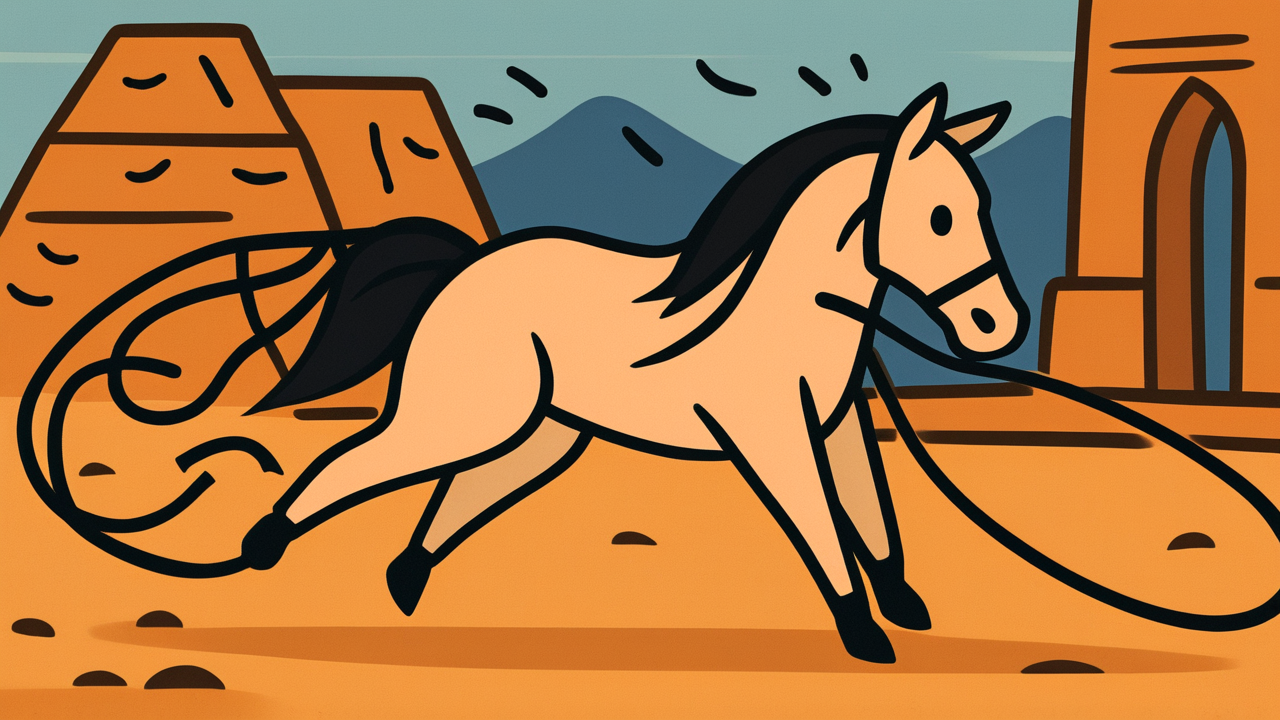How to Read “痩せ馬に鞭”
Yase uma ni muchi
Meaning of “痩せ馬に鞭”
“Thin horse to whip” expresses that harshly criticizing or forcing unreasonable demands on those who are weakened or lacking in ability is ineffective.
This proverb teaches the importance of identifying the root cause of problems. A thin horse cannot work not because it is lazy, but because of malnutrition or poor health. Similarly, when people cannot achieve expected results, various factors can be considered, not just lack of personal effort, but also environment, conditions, and demands that don’t match their abilities. Applying criticism or pressure in such situations only makes the situation worse.
The situations where this proverb is used include guiding subordinates or juniors, child-rearing, and team management – when in a position to lead someone. It suggests the importance of correctly understanding the other person’s current situation and providing necessary support and environmental improvements. Even today, when facing problems that cannot be solved through unreasonable demands or spiritual theories alone, this teaching serves as a very effective guideline.
Origin and Etymology
The origin of “Thin horse to whip” is based on actual experiences from times when horses were important labor forces. Horses were indispensable to people’s lives for farm work, transportation, and means of travel.
The background of this proverb’s creation lies in practical knowledge about horse handling. A thin horse is in a state where its physical strength has significantly declined due to malnutrition, illness, overwork, etc. Even if you whip such a horse and force it to work, you cannot obtain the expected results. On the contrary, it would further worsen the horse’s condition and, in the worst case, could lead to death.
People involved in horse breeding learned through such experiences the lesson that “for those who are weakened, recovery comes first.” They understood that rather than beating with a whip, providing sufficient feed and rest to restore physical strength was the path that could ultimately expect good work.
This proverb can also be found in Edo period literature and was applied to human relationships and organizational management even then. By using the familiar animal of a horse as an example, it clearly expressed the foolishness of forcing and the importance of appropriate consideration – a teaching born from life’s wisdom.
Usage Examples
- Assigning difficult work to a newcomer right away is like thin horse to whip, so let’s teach them the basics first
- Forcing overtime on a subordinate who is feeling unwell is thin horse to whip
Modern Interpretation
In modern society, the teaching of “Thin horse to whip” has become more important. Particularly as interest in work style reform and mental health increases, this proverb has taken on new meaning.
In companies, when seeking employee skill development and performance improvement, rather than simply imposing strict goal setting or long working hours, the provision of appropriate training opportunities, improvement of work environments, and mental support are emphasized. The “Thin horse to whip” approach has come to be recognized as a factor that actually reduces productivity and increases turnover rates.
The same applies to the field of education. Rather than imposing only criticism and repetitive practice on children who have learning difficulties, understanding individual characteristics and finding appropriate learning methods is emphasized. As understanding of developmental disabilities progresses, the importance of providing fundamental support rather than dismissing issues as “lack of effort” is widely recognized.
On the other hand, in modern times, the boundary line with “overindulgence” can become ambiguous. The ability to distinguish between true consideration and overprotection is required, and the essence of this proverb – “appropriate situational judgment and effective support” – serves as an important guideline in our more complex and delicate modern society.
When AI Hears This
The reality unfolding in “work style reform” workplaces is exactly like “whipping a skinny horse.” Behind the government’s beautiful slogan of “productivity improvement,” a structure has emerged that actually places heavier burdens on exhausted workers.
According to a Ministry of Health, Labour and Welfare survey, while overtime hours decreased after introducing work style reforms, about 70% of companies maintained the same workload. In other words, it’s an unreasonable demand to do the same work in less time. This has the same structure as ordering a weakened horse to run faster.
What’s particularly interesting is how this contradiction gets justified under the righteous banner of “efficiency.” For example, despite implementing IT systems supposedly to streamline operations, the actual burden increases due to learning new systems and double-checking procedures. Yet under the assumption that “digitalization must have boosted productivity,” even greater results are demanded.
This phenomenon is a variation of what economics calls the “productivity paradox.” The ironic reality that technological innovation doesn’t necessarily make things easier was already recognized by people in the Edo period through animal metaphors. Here lies the cleverness of a classic exploitative structure hidden behind the modern phrase “smart working.”
Lessons for Today
“Thin horse to whip” teaches modern people that true strength lies in the insight to assess others’ situations and the compassion to provide appropriate support.
We interact daily with various people – family, friends, colleagues. When someone among them cannot produce expected results, we sometimes want to say “try harder” or “you’re not making enough effort.” However, this proverb teaches us to stop and think. What is really needed – encouragement or concrete support?
In modern society, the circumstances and backgrounds that each individual carries have become more complex. Therefore, it’s important to have an attitude that seeks to comprehensively understand not just superficial results, but the person’s situation, abilities, physical condition, and other factors.
And above all, this proverb gives us kindness toward ourselves. When things don’t go as we think they should, rather than blaming ourselves too much, we should have the composure to think about what we need right now. That is the first step toward building sustainable growth and happy human relationships.



Comments